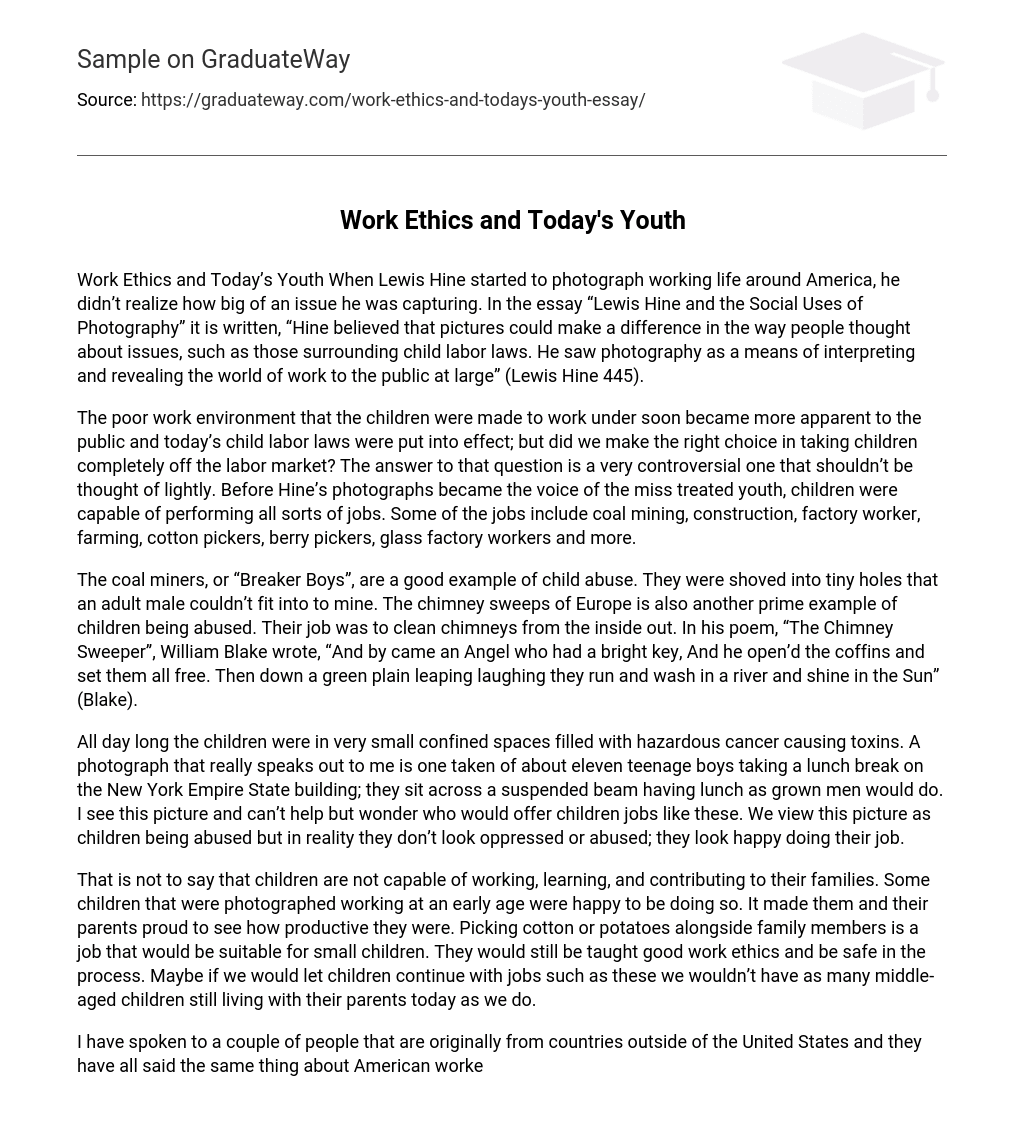Work Ethics and Today’s Youth When Lewis Hine started to photograph working life around America, he didn’t realize how big of an issue he was capturing. In the essay “Lewis Hine and the Social Uses of Photography” it is written, “Hine believed that pictures could make a difference in the way people thought about issues, such as those surrounding child labor laws. He saw photography as a means of interpreting and revealing the world of work to the public at large” (Lewis Hine 445).
The poor work environment that the children were made to work under soon became more apparent to the public and today’s child labor laws were put into effect; but did we make the right choice in taking children completely off the labor market? The answer to that question is a very controversial one that shouldn’t be thought of lightly. Before Hine’s photographs became the voice of the miss treated youth, children were capable of performing all sorts of jobs. Some of the jobs include coal mining, construction, factory worker, farming, cotton pickers, berry pickers, glass factory workers and more.
The coal miners, or “Breaker Boys”, are a good example of child abuse. They were shoved into tiny holes that an adult male couldn’t fit into to mine. The chimney sweeps of Europe is also another prime example of children being abused. Their job was to clean chimneys from the inside out. In his poem, “The Chimney Sweeper”, William Blake wrote, “And by came an Angel who had a bright key, And he open’d the coffins and set them all free. Then down a green plain leaping laughing they run and wash in a river and shine in the Sun” (Blake).
All day long the children were in very small confined spaces filled with hazardous cancer causing toxins. A photograph that really speaks out to me is one taken of about eleven teenage boys taking a lunch break on the New York Empire State building; they sit across a suspended beam having lunch as grown men would do. I see this picture and can’t help but wonder who would offer children jobs like these. We view this picture as children being abused but in reality they don’t look oppressed or abused; they look happy doing their job.
That is not to say that children are not capable of working, learning, and contributing to their families. Some children that were photographed working at an early age were happy to be doing so. It made them and their parents proud to see how productive they were. Picking cotton or potatoes alongside family members is a job that would be suitable for small children. They would still be taught good work ethics and be safe in the process. Maybe if we would let children continue with jobs such as these we wouldn’t have as many middle-aged children still living with their parents today as we do.
I have spoken to a couple of people that are originally from countries outside of the United States and they have all said the same thing about American workers; they are lazy. Instilling good work ethics into America’s youth has almost vanished. The concept of our youth’s abilities has depleted over time causing an increase in middle-age children. My uncle is a perfect example, he is thirty-six years old and has three children ages thirteen and eleven. I would consider him to still be a child, because he still lives with my Grandmother and doesn’t have a steady job.
His mother is just as much to blame for his laziness as he is since she was and still is enabling him. His case is one example of many classic cases of present day Americans. Another fantastic example of our work ethics slipping is college students. College has become a glorified high school continuance. Students are graduating at an older age year by year, so by the time they graduate for school and are ready to enter the working world they are roughly twenty-five without any job experience. Today we mold our children to become leaches instead of having life skills.
In the essay “Reading American Photographs” Alan Trachtenberg writes, “For the reader of photographs there is always the danger of overreading, of too facile a conversion of images into words” (Trachtenberg 510). Images of the coal mining boys and the construction boys having lunch were not being overread. In these images it is easy to read the message Hine is trying to convey. Other messages might not be so strait forward. “All photographs have the effect of making their subjects seem at least momentarily strange, capable of meaning several things at once, or nothing at all” (Trachtenberg 510).
Viewing an image without knowing what the artist or model was feeling, thinking, or trying to convey you aren’t able to fully understand the message they are trying to put forth. All you receive from the photograph is the message you interpret from it. In present society we would see a picture of three ten year old boys wearing suits as business men smoking cigarettes and immediately say that it was wrong; but these young men could be enjoying themselves working, and making money to help provide for their families. They behaved as adults because they were treated like one.
If we could find a good compromise that allows children to gain the knowledge of good working ethics in safe environments and be paid for their efforts, we would not only see a great increase in the economy but in education as well. Work Cited Blake, William. “The Chimney Sweeper”. Web “Lewis Hine and the Social Uses of Photography”. Reading Culture, sixth edition. New York,NY: Pearson/Langman 444-445 Trachtenberg, Alan. “Reading American Photographs” Reading Culture, sixth edition. New York, NY: Pearson/Langman 506-513





